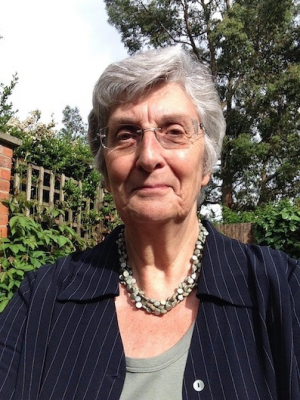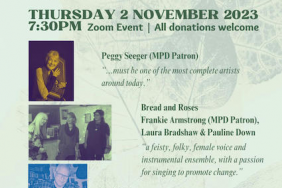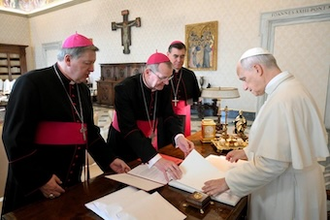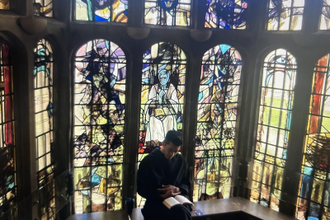Tribute to Bruce Kent by Chair of Pax Christi England and Wales

Ann Farr
Ann Farr, Chair of Pax Christi England and Wales, gave the following tribute during an online memorial to Bruce Kent yesterday, organised by the Campaign for Nuclear Disarmament (CND) and the International Peace Bureau. Other speakers included Kate Hudson, head of CND, and Jeremy Corbyn MP who spoke of "a terrible loss to our peace movement" and said that "Bruce's faith knew no religious boundaries". He also promised to have a Hornbeam tree planted in Finsbury Park in Bruce Kent's memory.
Thank you for organising this event to pay tribute to Bruce Kent. It is so difficult to choose the stories to share.
We have seen that Bruce had a very rounded and grounded approach to peace work. A man of compassion, he was deeply concerned about the injustices suffered by others whether it was the cleaner at his school, for whom he campaigned to have transport to work because of her long walk from home or a country, such as Biafra, which he visited in 1969 during the war, and saw that it was the people who were the victims of the imposed embargos. He said, "Biafra taught me the importance of fighting the causes of injustice - not just its symptoms."a
He always noticed and worked for those on the margins.
Pax Christi is an international movement, founded after WW2 because a French teacher took the initiative to pray for their enemies and encouraged others to do the same. It was not a popular initiative at the time.
In the UK, Pax Christi started in 1958 when a small group started meeting in London to discuss Church teaching on peace and to promote the international routes, which were marches/pilgrimages across Europe. The objective was to further peace by fostering international friendship. Bruce Kent was asked to be its Chaplain. As a Chaplain at London University, he encouraged students to take part in those routes and summer hostels. It is hard to believe now that most of our members were then under 30 years of age.
Bruce would frequently give talks about people who have had the courage to say "No" to war and one of his heroes was Franz Jagerstatter, the Austrian farmer who was executed in 1943 for refusing to fight in Hitler's army and Franz remains a very significant part of Pax Christi's education work. Bruce and Valerie led pilgrimages to Franz's birth place and got to know his widow, who had supported her husband and brought up their three children on her own. As recently as May this year, Bruce took part in the annual ceremony in Tavistock Square, London, to honour conscientious objectors throughout the world.
Bruce had a real gift for being a networker and for encouraging organisations involved in peace, development, human rights and, more recently, climate to cooperate and draw together the threads that link them.
In recognition of all his work, Bruce was one of the first people to receive our Pax Christi Peace Award in 2001. He would never miss a Pax Christi AGM and took his role as a Vice-President extremely seriously - engaging critically with the movement and speaking in the name of Pax Christi in the public arena.
Hearing him speak, with clarity and humour, was an unforgettable experience for so many people as the tributes to him show
I live in Coventry, a City of Peace and Reconciliation and Bruce visited several times, for the END Conference, to speak to my Sixth Form group, to deliver the Lord Mayor's Annual Peace Lecture, to speak at the Hiroshima Day service and to take part in a debates
In 2009 he was given The Coventry International Prize for Peace and Reconciliation, awarded each year, on the anniversary of the bombing, ' in recognition of a lifetime devoted to campaigning for peace, justice and human rights.' , having 'influenced whole generations in their understanding of the terror of war and the urgency of peace.'
In November last year, Coventry University awarded Bruce an Honorary Doctorate of Letters. He spoke especially to all the young graduates ,
'Young people - please think for yourselves. Don't be swept along by whatever happens to be the propaganda of the day. Ask your own critical questions:
Why is it OK for charities to raise money for the war victims in Yemen, but not OK for them to ask why Britain is selling bombs to Saudi Arabia?'
Bruce always encouraged people - especially the young - to exercise their democratic right as global citizens to influence policy. He consistently offered a perspective based on moral principles, international law, and support for the United Nations. His work was based on the belief that human beings can create a world in which war will become obsolete. At his funeral on Monday, among the symbols placed on his coffin were very well thumbed copies of the Psalms and the UN Declaration of Human Rights,
Pax Christi England and Wales would not be the organisation it is today without the creative energy, enthusiasm and support of Bruce Kent, since its early days in the 60s.
So many of us will miss being with him at vigils, services, demonstrations and on peace walks. We will miss chatting with him on a bench or on a nearby wall as events carry on in front of us - as we did when we looked out on Flanders Fields, reflecting on the destruction and loss of life in war.
Courageously outspoken, deeply concerned about the injustices suffered by others and working tirelessly for an end to nuclear weapons and militarism to achieve peace, Bruce has made a difference that is impossible to measure. We shall miss his presence, his questioning interest, his challenges, his knowledge of history, his wealth of experience and of course his humour that never failed to lighten our gatherings.
Bruce lived out his favourite quote from Catholic Social Teaching: 'Peace is the fruit of anxious daily care to see that each person lives in justice, as God intends.' We will try to carry on walking that path in our lives too.
Ann Farr is a speaker on Sunday 24 July at the NJPN annual conference in Derbyshire. See: www.justice-and-peace.org.uk/conference/


















